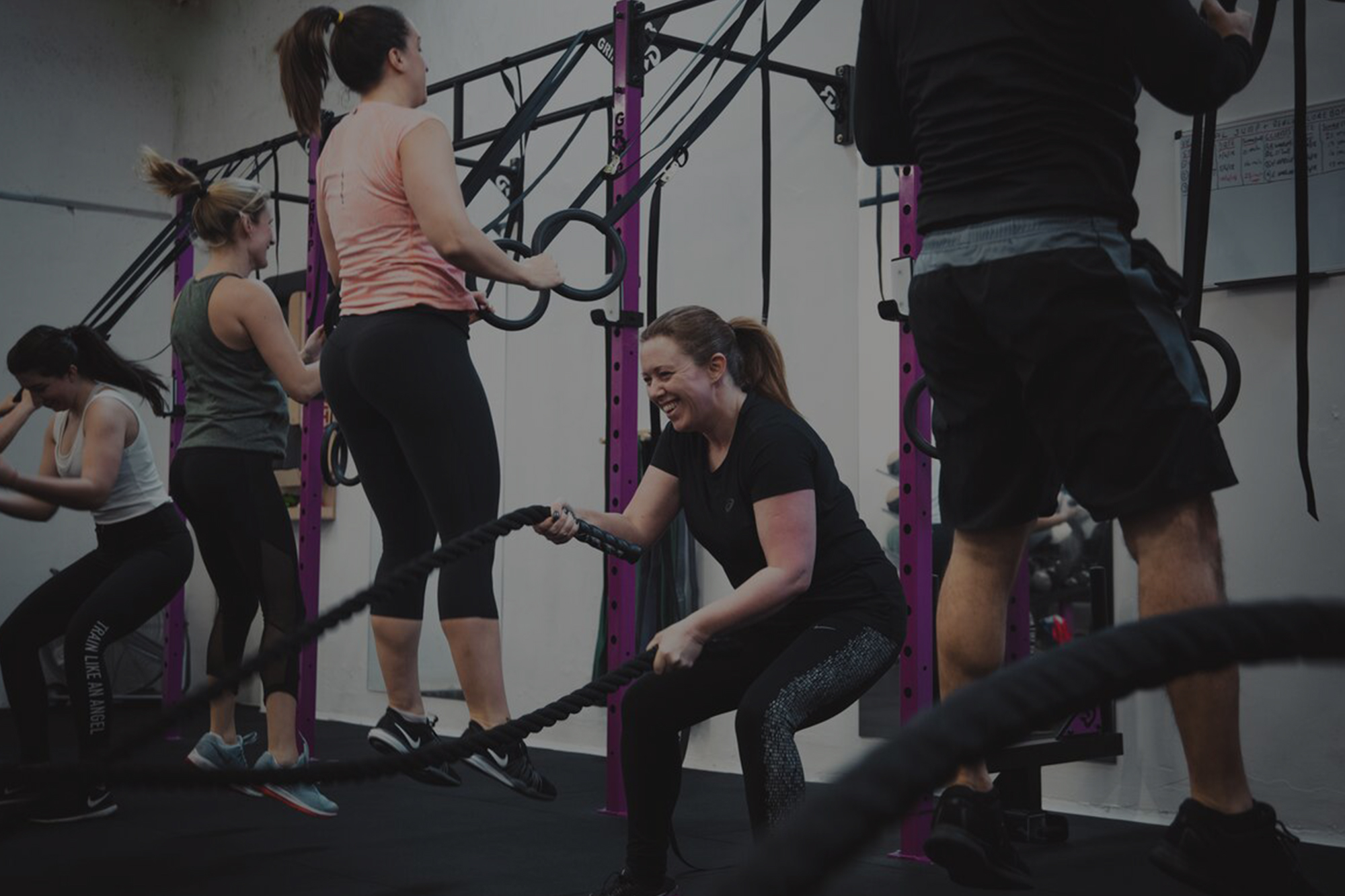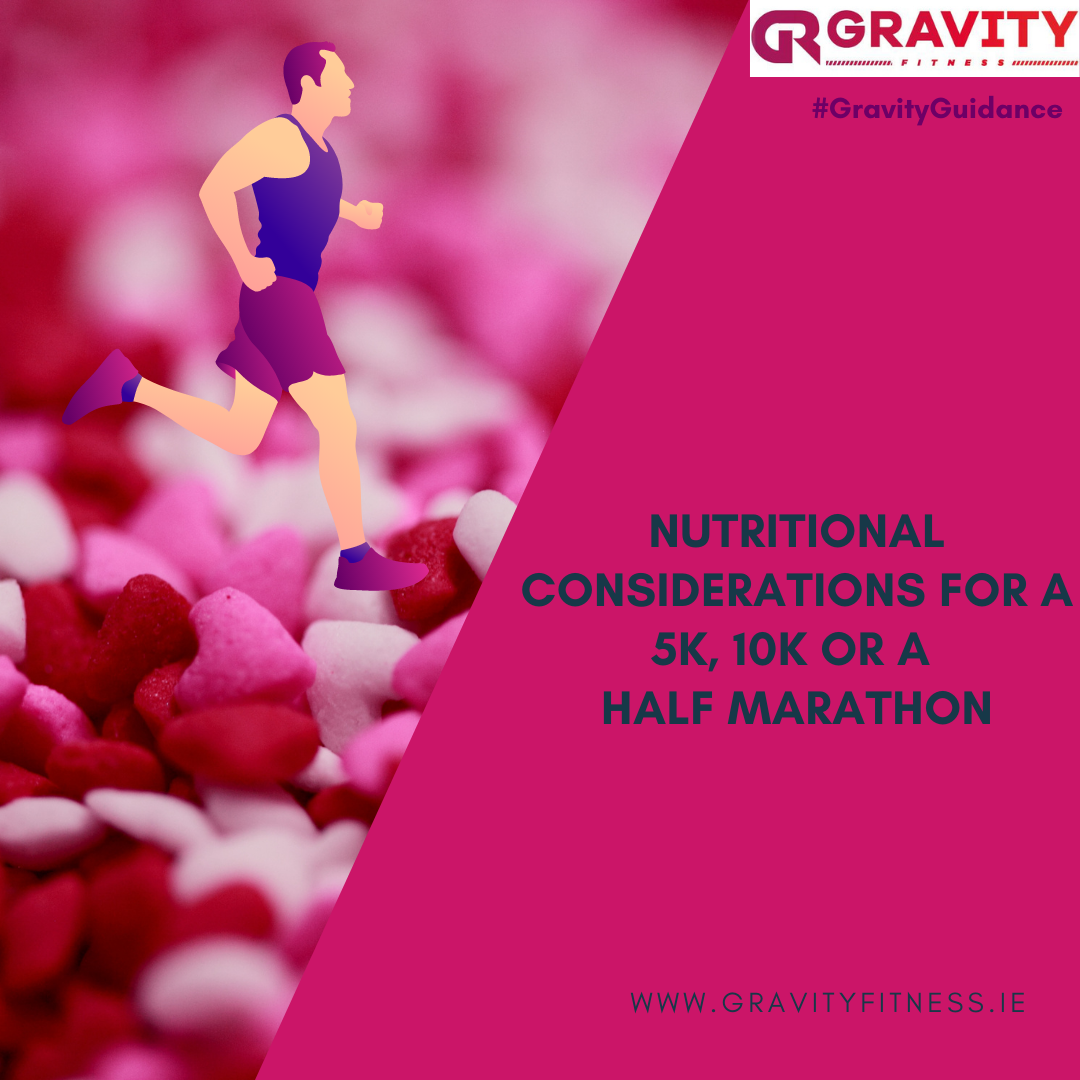
Hi it’s Conor here from Gravity Fitness again. I am the nutritionist here at Gravity Fitness. I have a nice article to read in your own time about nutritional considerations when running 5k, 10k or a half marathon. Gravity Fitness has a charity run this summer. This article will benefit you for any distances you want to run that I mentioned. Thank you for reading.
When training for a run – whether it be for a long-distance (half or full marathon) run, or just wanting to get a fast PB on your 5-10km time – it is vitally important that you are properly fuelled for whichever distance you are aiming to complete. This includes your fluid needs, carbohydrates & protein requirements, and meal timing. We’ll also cover tips for anyone who experiences any gastrointestinal issues when running.
Requirements for carbohydrate, protein, vitamins and minerals and fluids vary depending on training phase. An individual’s carbohydrate intake should reflect their daily training load; increasing total carbohydrate and energy intake during high-volume days and decreasing intake when volume and intensity are reduced (e.g. easy, recovery days). Nutrient-dense, carbohydrate-rich foods (such as wholegrain breads and cereals, starchy vegetables, fruit, dairy) should be prioritised to meet fuel demands, however there may also be a need to include additional carbohydrate-rich foods/drinks (e.g. sports drinks, energy gels) around training to improve performance during heavy training loads. Strategic intake of carbohydrate rich foods/drinks soon after training will aid rapid muscle glycogen repletion, particularly if training twice on the same day or late evening into early morning. Including protein rich foods throughout the day assists to build new muscle protein and red blood cells as part of the repair and adaptation process of training.
Water
No matter what distance you’re doing, it is vital that you’re fully hydrated. However, the longer the distance, the more difficult it can be for you to stay optimally hydrated. So, a general rule of thumb for every day life is to drink 1ml for every 1 calorie expended. If you have a smart-watch, this should give you a ball-park number of how many calories you use in a day. Similarly, if you use a MyZone tracker during your runs/workouts it will give you a rough estimate of your calories from your time when wearing it.
– In terms of pre-exercising, you should look to drink between 6-8ml of water per kilo of body weight around 2 hours before exercise. Eg, if you’re 70kg and drink 8ml per kilo you would be looking to drink 560ml of water.
– Post-exercise, you should be looking to take in what you’ve used up – this is where your MyZone or smart-watch comes in very handy in telling you what you’ve expended during your run or workout. If you’ve burned 400 calories, look to drink 400ml about 4-6 hours after exercise.
- 5km – You don’t have to plan too far ahead. As long as you’re fully hydrated beforehand and drink adequately afterwards you should be fine.
- 10km – Similar to 5km, as long as you’re fully hydrated beforehand you should be ok. However, it could be a good idea to have a small bottle of water to sip on or have a little station around 5-6km in to grab a quick drink while on the run, especially if it’s warm out.
- Half Marathon (21.2km) – This is where you really do need to plan ahead. Being fully hydrated, as always. Having a small bottle with you will be extremely helpful. Also, having a station every 5-6km will help you.
*You don’t necessarily have to stick with water – you can opt for a carbohydrate (Lucozade) drink as well.
Carbs
For this, it can be a little bit more specific based on a few things – distance, time, intensity and body weight. We’ll be looking at how much carbohydrate food, in grams you should be eating depending on your goals. *We’ve included a table that you can refer to here.
- 5km – If you’re aiming to finish, then aim for the, ‘light’, 3-5g carbs per kilo when you’re doing the run itself. For a fast time, where you’re really trying to push yourself hard you should look to take in the, ‘moderate’, level for carbs, 5-7g per kilo.
- 10km – Again, if you’re just trying to finish the run then aim for the moderate levels, 5-7g per kilo. If you’re trying for a fast time, then go for the ‘high’ 6-10g per kilo. During the run, it can also be helpful to take in an energy gel/tablet or carbohydrate drink after 5-6km.
- Half Marathon (21.2km) – You will be in the ‘high’ level here no matter if you’re just trying to finish or push yourself for a fast time. 6-10g per kilo of body weight (10g is you’re pushing yourself). An energy gel or tablet after 10km and 16km can really help, too.
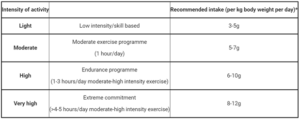
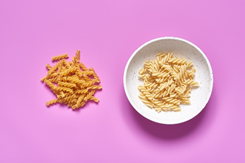
- 100g of pasta and spaghetti as shown above – this is equal to a 1 cup full measurement.
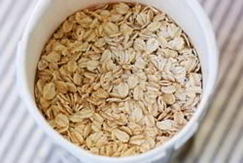
- 100g of rice, is equal to half a cup measurement.
- 100g of oats, above as shown, is equal to a 1 full cup measurement.
Protein
This is a little less complicated, no matter what distance you’re doing you are doing. You should be looking to take in 1.2-2grams of protein – the upper range of that if you’re training at a high level.
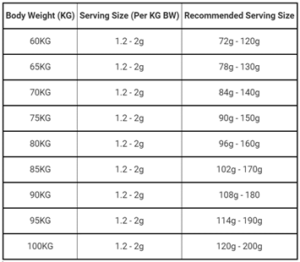
For protein serving sizes, just enter in your serving into My Fitness Pal or Chronometer – eg, 1 chicken breast, or half a steak, or 1 block of tofu etc – and it will give you an accurate number of what’s in your food. Also another way of calculating portion size is pam of your hand. 1 x palm for a women and 2 x palms for a male see below on the far left.

Meal-Timing
For longer distances, carbohydrate loading over the 24-48 hours before the event can help to increase glycogen stores, improving fuel availability during the event. Consuming low fibre foods, reducing high protein or high fat foods and using compact liquid carbohydrate foods over the last 12-24 hours before the event can help to reduce the risk of stomach upset during the race.
The pre-event meal is a vital opportunity for a final top up of glycogen stores and to optimise hydration levels. For an early morning run, where time is scarce – a light, low fibre carbohydrate-rich snack can be eaten 1-2 hours before the race.
A later race time might allow for a larger meal 3-4 hours before the start of the event, followed by a small snack or carbohydrate containing fluid closer to the race start. These meals should be practised in training before a long run so you know what works well for you, as an individual.
Gastrointestinal-Issues
Gastrointestinal upset during hard runs is quite common. Many people often prefer to run on an empty stomach, with the pre-training food/drink eaten well in advance of the session. Low fibre foods or liquid meal supplements before hard training sessions may also help reduce concerns.
It’s good to avoid too much caffeine, high-fibre food, high fructose foods and also high-fat foods if you suffer from any issues here.
Recovery
High-intensity training sessions, workouts or long/fast runs deplete/consume a lot of your glycogen stores, so consuming a carbohydrate-rich meal/snack soon after finishing will help to maximise recovery. In addition, the recovery meal or snack should include around 20-25g of high-quality protein to aid with muscle repair. Including healthy fats will also help to reduce inflammation. Fluids (predominantly water) should also be included to rehydrate and replace sweat losses. Nutrient-rich wholefood choices should be prioritised over protein/energy bars and other ‘health snacks.
A good tip for this can be to have a protein shake/smoothie with a quarter cup of blended oats and a teaspoon of peanut/almond butter – this takes care of protein and carb requirements along with healthy fats to aid in metabolism and immune function.
Females
For females it is important to monitor your menstrual cycle and train appropriately during it. For more information on this, please refer to our recent Instagram post or blog on our website which goes into even more detail.
*Hyperlinks for each have been attached.
Written by Conor Hogan.




